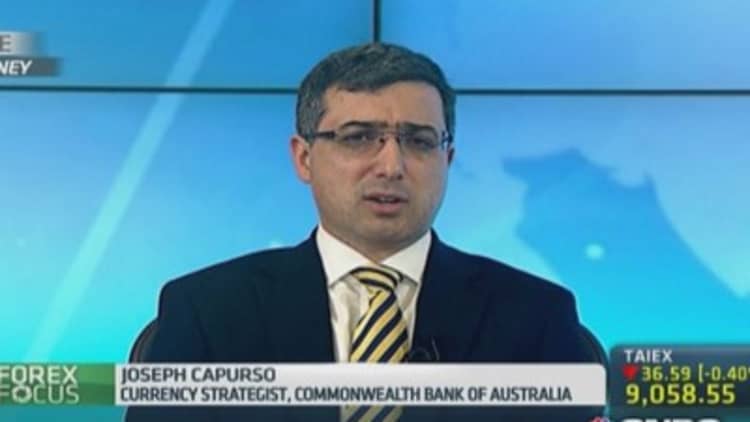Asian currencies could be in for a wild ride in 2015, with central bank policy on track for further divergence as the Federal Reserve prepares to raise interest rates, analysts say.
"The U.S. Federal Reserve will be hiking interest rates next year, while some Asian central banks will be acting in the opposite direction. Growth momentum is firmly in favor of the U.S., while structural and cyclical slowdowns in certain parts of Asia will see growth differentials narrow," ANZ said in a note last week.
The Federal Reserve is widely expected to hike interest rates in July after unwinding its quantitative easing program this year, according to CNBC's latest Fed survey of economists, strategists and fund managers, released last week.
By contrast, most of Asia's central banks are easing. The People's Bank of China cut interest rates for the first time in two years in October, while the Bank of Korea cut rates to a record low that month. Meanwhile, the Bank of Japan remains committed to its massive stimulus effort, while calls for rate cuts in Thailand and Australia are growing.
ANZ forecasts 3 percent depreciation in Asian currencies over 2015, "a similar decline to that seen in 2014," noting that "risks are tilted towards a larger depreciation should tighter U.S. monetary policy lead to larger portfolio outflows from the region."
Saxo Capital Markets agrees.
"The world's major central banks and economies are entirely out of sync and the oil price collapse has added a dramatic new geopolitical and economic twist to global markets," Saxo's head of foreign-exchange strategy John Hardy said in a note last week. He anticipates " strength on U.S. outperformance" next year.
Catalysts for volatility
There are four potential 'what if' catalysts for currency volatility next year, according to Hardy: U.S. junk bond outflows, the resignation of European Central Bank (ECB) president Mario Draghi, Chinese yuan devaluation and a substantial weakening in the Japanese yen.
"There are already signs that the junk bond market in the U.S. is under severe strain here late in 2014. Liquidity is terrible in these bonds," Hardy said. "Junk bonds related to the U.S. shale oil are the most clearly in the danger zone and investor flow out of bonds could see mayhem and see the Fed ceasing all thoughts of hiking rates," which would see the dollar weaken sharply.

Corporate junk bond funds are on track for their worst performance in six years, according to Reuters, with high-yield mutual funds up 2.8 percent year-to-end-November,while the Merrill Lynch junk bond index dropped 1.6 percent between June and November.
Meanwhile, ECB president Draghi does not have the support needed for the dramatic easing he wishes to use to keep the euro zone out of the deflation danger zone; inflation stood at a five-year low of 0.3 percent on year in November. If Draghi does not get what he wants, he could resign in 2015, which would see the euro jump,Hardy said.
In China, as the risk of deflation rises amid the unwinding of its credit bubble, there's a risk that China will tear a page from the Bank of Japan's playbook and devalue the yuan, he said. This would export a wave of deflation to the rest of the world,launching "a whole new and dangerous chapter of the currency wars."
Read MoreThe yen looks like it's ready to get crushed
For the yen,"there is the distinct risk that the Bank of Japan's new easing program is simply too much and we see a domestic collapse in confidence in the yen in 2015 on an avalanche outflows," Hardy added.
To rise and fall
The and Malaysian ringgit are the only two Asian currencies that ANZ expects to appreciate against the dollar next year.
"For [yuan], we expect the authorities to maintain a stable to modestly appreciating fix, with the trade surplus and increased investor interest in onshore Chinese assets leading to a stronger yuan," it said.
"Meanwhile, the December selloff in [the ringgit] on the back of the slump in oil prices looks overdone to us, and we expect the ringgit to correct slightly from its oversold levels," it added. The U.S. dollar is up around 1.6 percent against the ringgit month-to-date.
At the bottom of the barrel, ANZ tips the as next year's likely worst performer in the Asian currency space: "Korea's export competitiveness is being severely eroded from a weak [yen] and increased competition from China. The won's real effective exchange rate against the yen is getting close to all-time highs, and a weaker currency is needed."


